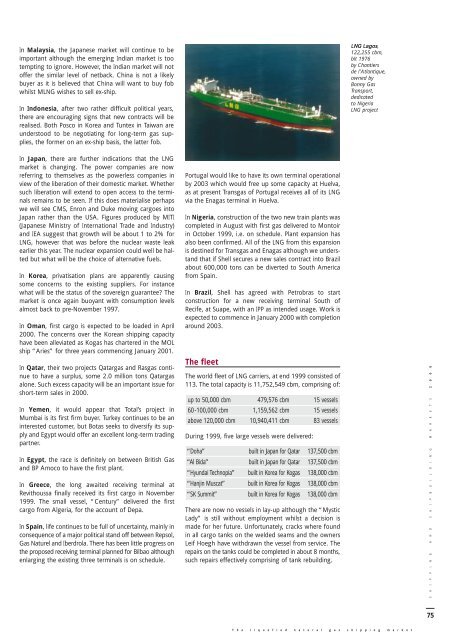You also want an ePaper? Increase the reach of your titles
YUMPU automatically turns print PDFs into web optimized ePapers that Google loves.
In Malaysia, the Japanese market will continue <strong>to</strong> be<br />
important although the emerging Indian market is <strong>to</strong>o<br />
tempting <strong>to</strong> ignore. However, the Indian market will not<br />
offer the similar level of netback. China is not a likely<br />
buyer as it is believed that China will want <strong>to</strong> buy fob<br />
whilst MLNG wishes <strong>to</strong> sell ex-ship.<br />
In Indonesia, after two rather difficult political years,<br />
there are encouraging signs that new contracts will be<br />
realised. Both Posco in Korea and Tuntex in Taiwan are<br />
unders<strong>to</strong>od <strong>to</strong> be negotiating for long-term gas supplies,<br />
the former on an ex-ship basis, the latter fob.<br />
In Japan, there are further indications that the LNG<br />
market is changing. The power companies are now<br />
referring <strong>to</strong> themselves as the powerless companies in<br />
view of the liberation of their domestic market. Whether<br />
such liberation will extend <strong>to</strong> open access <strong>to</strong> the terminals<br />
remains <strong>to</strong> be seen. If this does materialise perhaps<br />
we will see CMS, Enron and Duke moving cargoes in<strong>to</strong><br />
Japan rather than the USA. Figures produced by MITI<br />
(Japanese Ministry of International Trade and Industry)<br />
and IEA suggest that growth will be about 1 <strong>to</strong> 2% for<br />
LNG, however that was before the nuclear waste leak<br />
earlier this year. The nuclear expansion could well be halted<br />
but what will be the choice of alternative fuels.<br />
In Korea, privatisation plans are apparently causing<br />
some concerns <strong>to</strong> the existing suppliers. For instance<br />
what will be the status of the sovereign guarantee? The<br />
market is once again buoyant with consumption levels<br />
almost back <strong>to</strong> pre-November 1997.<br />
In Oman, first cargo is expected <strong>to</strong> be loaded in April<br />
2000. The concerns over the Korean shipping capacity<br />
have been alleviated as Kogas has chartered in the MOL<br />
ship “Aries” for three years commencing January 2001.<br />
In Qatar, their two projects Qatargas and Rasgas continue<br />
<strong>to</strong> have a surplus, some 2.0 million <strong>to</strong>ns Qatargas<br />
alone. Such excess capacity will be an important issue for<br />
short-term sales in 2000.<br />
In Yemen, it would appear that Total’s project in<br />
Mumbai is its first firm buyer. Turkey continues <strong>to</strong> be an<br />
interested cus<strong>to</strong>mer, but Botas seeks <strong>to</strong> diversify its supply<br />
and Egypt would offer an excellent long-term trading<br />
partner.<br />
In Egypt, the race is definitely on between British Gas<br />
and BP Amoco <strong>to</strong> have the first plant.<br />
In Greece, the long awaited receiving terminal at<br />
Revithoussa finally received its first cargo in November<br />
1999. The small vessel, “Century” delivered the first<br />
cargo from Algeria, for the account of Depa.<br />
In Spain, life continues <strong>to</strong> be full of uncertainty, mainly in<br />
consequence of a major political stand off between Repsol,<br />
Gas Naturel and Iberdrola. There has been little progress on<br />
the proposed receiving terminal planned for Bilbao although<br />
enlarging the existing three terminals is on schedule.<br />
Portugal would like <strong>to</strong> have its own terminal operational<br />
by 2003 which would free up some capacity at Huelva,<br />
as at present Transgas of Portugal receives all of its LNG<br />
via the Enagas terminal in Huelva.<br />
In Nigeria, construction of the two new train plants was<br />
completed in August with first gas delivered <strong>to</strong> Mon<strong>to</strong>ir<br />
in Oc<strong>to</strong>ber 1999, i.e. on schedule. Plant expansion has<br />
also been confirmed. All of the LNG from this expansion<br />
is destined for Transgas and Enagas although we understand<br />
that if Shell secures a new sales contract in<strong>to</strong> Brazil<br />
about 600,000 <strong>to</strong>ns can be diverted <strong>to</strong> South America<br />
from Spain.<br />
In Brazil, Shell has agreed with Petrobras <strong>to</strong> start<br />
construction for a new receiving terminal South of<br />
Recife, at Suape, with an IPP as intended usage. Work is<br />
expected <strong>to</strong> commence in January 2000 with completion<br />
around 2003.<br />
The fleet<br />
The world fleet of LNG carriers, at end 1999 consisted of<br />
113. The <strong>to</strong>tal capacity is 11,752,549 cbm, comprising of:<br />
up <strong>to</strong> 50,000 cbm 479,576 cbm 15 vessels<br />
60-100,000 cbm 1,159,562 cbm 15 vessels<br />
above 120,000 cbm 10,940,411 cbm 83 vessels<br />
During 1999, five large vessels were delivered:<br />
“Doha” built in Japan for Qatar 137,500 cbm<br />
“Al Bida” built in Japan for Qatar 137,500 cbm<br />
“Hyundai Technopia” built in Korea for Kogas 138,000 cbm<br />
“Hanjin Muscat” built in Korea for Kogas 138,000 cbm<br />
“SK Summit” built in Korea for Kogas 138,000 cbm<br />
There are now no vessels in lay-up although the “Mystic<br />
Lady” is still without employment whilst a decision is<br />
made for her future. Unfortunately, cracks where found<br />
in all cargo tanks on the welded seams and the owners<br />
Leif Hoegh have withdrawn the vessel from service. The<br />
repairs on the tanks could be completed in about 8 months,<br />
such repairs effectively comprising of tank rebuilding.<br />
LNG Lagos,<br />
122,255 cbm,<br />
blt 1976<br />
by Chantiers<br />
de l’Atlantique,<br />
owned by<br />
Bonny Gas<br />
Transport,<br />
dedicated<br />
<strong>to</strong> Nigeria<br />
LNG project<br />
T h e l i q u e f i e d n a t u r a l g a s s h i p p i n g m a r k e t<br />
S H I P P I N G A N D S H I P B U I L D I N G M A R K E T S 2 0 0 0<br />
75


